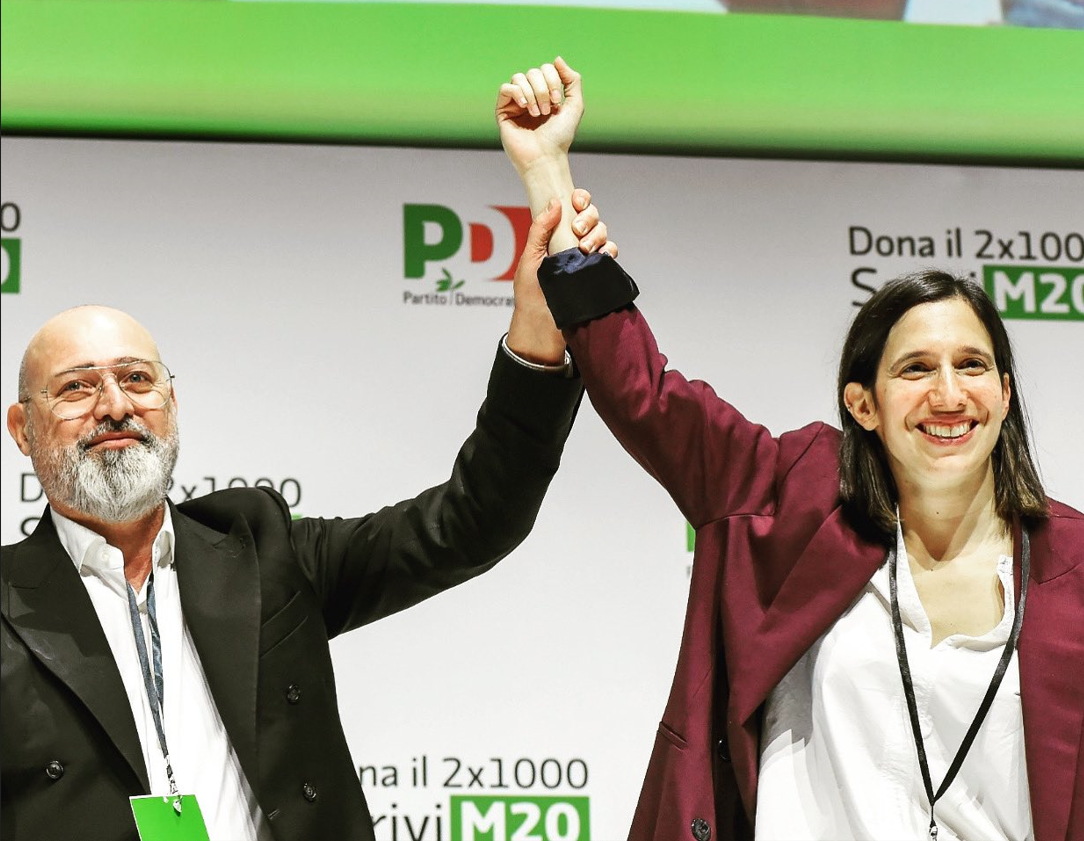Lucrezia Rossi (DCU Brexit Institute) and Niccolò Ruffin (Trade Association Officer)
On Sunday 12 March, the Assembly of delegates of the Italian Partito Democratico (PD) officially appointed Elly Schlein as the party Secretary and Stefano Bonaccini as its President. As of today, Schlein is the ninth leader of the PD since its inception 16 years ago.
“Together, we made a small revolution. Once again, they didn’t see us coming”. These are the words that Schlein, the newly appointed leader of the PD, pronounced immediately after her victory. Indeed, the results were unexpected as Stefano Bonaccini – who ran against Schlein – had been the most favoured candidate. So, who is Elly Schlein, first woman to lead the second-largest Italian party and why did she win the elections?
At 37 years old, Schlein is the leader of a new generation and can be considered something of an outsider: young, holder of three citizenships (Italian, American and Swiss), bisexual and a woman. Before becoming Vice-President of the Emilia Romagna region (2020-2022) and MP in the Italian Chamber of the Parliament (2022), Elly Schlein served as MEP in the European Parliament (2014-2019). She left the Partito Democratico in 2015 when it was under the leadership of Matteo Renzi, re-joining it only a while ago. Because of that, over the years she has been able to grow the number of supporters both inside the PD and beyond it.
Other than Schlein’s ability to raise support for her programme, another factor played a major role in leading her towards the party secretariat. The PD is actually the only Italian party with an “open primary,” allowing those who are not registered with the party itself to choose its leader. Statistics show that Schlein won the vote of Italians not registered with the PD; indeed, 58% of not registered people preferred Schlein over Stefano Bonaccini. On the contrary, amongst the voters registered with the PD, only 43% supported Schlein. A deeper analysis of the vote results shows that Schlein won the vote of people who claim themselves to be more politically left-oriented: 63% of left voters and 52% of centre-left voters supported Schlein. On the contrary, people placing themselves either centre or right tended to give their vote to Bonaccini. Finally, a recent poll by Supermedia shows that the PD increased its popularity by 1.9%, since February 2023. It may be not a significant step forward (especially considering that the largest party, Fratelli d’Italia led by Prime Minister Giorgia Meloni, is more than 10% points ahead of PD), however another poll shows that 32% of Movimento 5 Stelle (led by Giuseppe Conte) and 34% of Terzo Polo (led by Carlo Calenda) supporters are more likely to vote PD in the future as long as Elly Schlein leads it.
The message is therefore clear and reveals the preference of Italians for a PD that leans to the left rather than to the centre. Although the programmes of both Stefano Bonaccini and Elly Schlein are similar at their core, the latter was more leftist than the former. In this regard, while the PD will try its best to move to the left to find a new identity to counter the Italian right (presently in government, led by the Prime Minister Giorgia Meloni and her party Fratelli d’Italia), Elly Schlein will have to face two major challenges. The first will come from the inside of her party (namely her low support among the registered PD voters) and the second one coming from the right parties. As a matter of fact, the Italian right try to protray Elly Schlein as radical chic in comparison to Meloni. Having opposite political ideals, the two women differ also on their past and background experiences. While Meloni holds a high-school diploma, fights for the so-called “traditional family” and to defend Italian borders from immigrants, Schlein holds a master’s degree in law, came out as bisexual and fights for migrants’ rights.
On this basis, the rise of a political bipolarism in Italy is more and more likely to happen and it will be grounded in the opposite thinking of the two women leading Italian politics. It will surely be interesting to closely monitor the evolving situation of Italian politics from now up to 2024, when the European elections will be held.
Lucrezia Rossi is the Project Coordinator of the DCU Brexit Institute.
Niccolò Ruffin works as Trade Association Officer for an Italian Company.
Photo Credits: Partito Democratico
The views expressed in this blog reflect the position of the author and not necessarily that of the Brexit Institute Blog.



